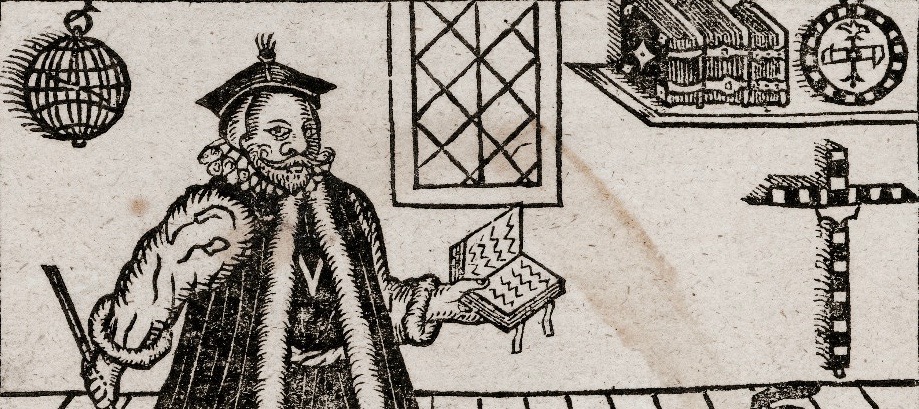The Marlowe Society of America's 8th International Conference will be held in Wittenberg, Germany, from 10–13 July, 2018. Hosted by MSA President Kirk Melnikoff, the conference will feature keynote presentations by Lukas Erne (University of Geneva), Kristen Poole (University of Delaware), and Holger Syme (University of Toronto). Tours of the Luther House, the Melanchthon House, the Castle Church, and Cranach Studios will complement special events, workshops, screenings, and productions designed specially for conference attendees. We hope you will join us.
Michael L. Stapleton Wins Roma Gill Award
The year 2017 marks 2000 years since the death of Ovid, and scholars and theater companies are commemorating the enduring impact of his work with a series of initiatives, including the Royal Shakespeare Company’s Three Tales from Ovid (by Amber Hsu). It is fitting, then, that the Marlowe Society of America honors Marlowe's Ovid: The Elegies in the Marlowe Canon by Michael L. Stapleton with its Roma Gill prize for 2013-14. More than timely, this deeply researched and beautifully written monograph reminds us of Marlowe’s “living classicism,” when Ovid seemed always in his ear and always on his mind. Rather than attempt to track all instances in which Marlowe is indebted to Ovid, Stapleton focuses specifically on the influence of the Amores and the effect that their translation into English had on Marlowe's work. He is particularly qualified to assess that effect, having given the academic world Harmful Eloquence: Ovid’s Amores from Antiquity to Shakespeare (1996). A daily reader of Latin, the rewards of which are manifest also in his New Variorum Julius Caesar, Stapleton moves comfortably between Ovid’s and Marlowe’s poems, generously allowing readers (by parenthetical citation) to recall what remains of their own high school Latin and appreciate the linguistic subtlety both of the poets and their academic advocate.
Challenging long-standing critical opinion that has perceived All Ovids Elegies and Certaine of Ovids Elegies either as juvenilia or distractions from the stage plays, Stapleton argues that this translation work compelled Marlowe “to learn an extremely important technique that he would need to master as a professional playwright in the London theaters: creating the illusion, in poetical form, of a human being speaking to others, and to himself or to an audience in soliloquy” (25-6). Stapleton shows how translation helped Marlowe “begin an Ovidian career” (29). He also subjects the reputations of Virgil vs. Ovid to scrutiny; and in so doing, he turns from the strictly “bibliographic-editorial” and “cultural-historical” treatments of the Elegies to reclaim their poetic importance (39). Indeed, one of the strengths of Marlowe’s Ovid is to remind scholars who work mostly with theater that Marlowe was a lyric poet. Substantive yet on point, the footnotes offer ancillary studies both of Elizabethan classicism and non-dramatic poetry (kudos to Ashgate for rendering those notes as footnotes, enabling reading on parallel tracks without flipping pages). And, to the early modern enthusiast weary of the scholarship on alleged radical political and sexual behavior, Stapleton offers relief. He situates Marlowe among the literati as a fellow with the great lyricists of his time who were Englishing Latin forms and personae into the sonnet sequence and epyllion.
Roma Gill Award Committee: David McInnis (Chair), Paul Menzer, Roslyn L. Knutson
Wittenberg 2018, Call for Papers
The Marlowe Society of America's 8th International Conference will be held in Wittenberg, Germany, from 10–13 July, 2018. Hosted by MSA President Kirk Melnikoff, the conference will feature keynote presentations by Lukas Erne (University of Geneva), Kristen Poole (University of Delaware), and Holger Syme (University of Toronto). Tours of the Luther House, the Melanchthon House, the Castle Church, and Cranach Studios will complement special events, workshops, screenings, and productions designed specially for conference attendees. We hope you will join us—and participate.
Papers should be no more than fifteen minutes in length and present original research on any topic concerning the works of Christopher Marlowe. We welcome proposals for individual papers and complete panels. Please send the following by email to the conference Program Chair, Lucy Munro, University of London, King’s College: lucy.munro@kcl.ac.uk:
For individual papers, an abstract of 300–500 words;
For complete panels, an overview of the panel and abstracts of the individual papers, totaling 1200–1500 words.
The deadline for submission of abstracts is Friday, July 28, 2017.
Welcome!
Welcome to the Marlowe Society of America's new website. We hope that you'll take a few minutes to discover what our organization has to offer in the way of intellectual community, conferences, prizes, and resources relating to Christopher Marlowe's works, life, and times. We also hope you'll consider becoming a member of the MSA and participating in our upcoming conference in Wittenberg, Germany (July 2018).
For the most up-to-date announcements about MSA activities, please like us on Facebook and/or follow us on Twitter @MarloweMightyLn.

